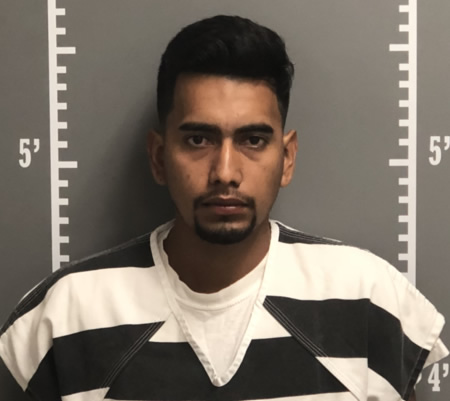Hearing for man accused of killing UI student Mollie Tibbetts begins Tuesday
An evidence-suppression hearing for Cristhian Bahena Rivera will look into whether law enforcement violated his rights during his arrest and questioning.

Cristhian Bahena Rivera (contributed)
October 21, 2019
The man accused of killing University of Iowa student Mollie Tibbetts in 2018 will appear at the Poweshiek County Courthouse Tuesday for an evidence-suppression hearing determining whether or not authorities violated his rights.
Authorities said Cristhian Bahena Rivera confessed to abducting and killing Tibbetts while she was out for a run near Brooklyn, Iowa, on July 18, 2018. After he led officers to her body Aug. 21, 2018, he was charged with first-degree murder. He has pleaded not guilty.
According to the court documents, Bahena Rivera’s attorneys assert “he was in custody from the moment he left the farm [where he worked] and should have been immediately Mirandized” and that his statements to officers are “involuntary” under the Fifth Amendment.
The defense also claims Bahena Rivera’s initial consent to search his vehicle was “invalid,” but the warrant to search the vehicle issued Aug. 20, 2018 was not challenged.
In the state’s response to the defense’s statements, documents read that the state resists suppressing any evidence found in Bahena Rivera’s vehicle, as both his consent and the search warrant was valid.
The state said the first time Bahena Rivera was read his Miranda rights at 11:30 p.m. Aug. 20, 2018, was incomplete because “the officer giving it inadvertently omitted informing the defendant what he says can be used against him in court at a later time.” The office did not have a Miranda card at the time and did not tell Bahena Rivera that anything he said could be used against him in court, documents said.
Bahena Rivera was read his complete Miranda rights at 5:50 a.m. Aug. 21, 2018, documents read. He then waived his Miranda rights and told officers things that implicate him in Tibbetts’ murder.
The state feels that all statements Bahena Rivera made between Miranda readings should be suppressed because the first reading was incomplete, documents said. However, “the state does not concede the statements made following the incomplete Miranda warning are involuntary, coerced, or the product of a false confession.”
In addition, the state asserted that Tibbetts’ body would have been found regardless of Bahena Rivera’s statements to officers.
Bahena Rivera’s black Malibu was seen on surveillance footage in the area Tibbetts was running in before she disappeared. After law enforcement found Bahena Rivera in his vehicle and asked if he knew anything about Tibbetts’ disappearance in August 2018, Bahena Rivera said he didn’t know anything about the case.
On Aug. 20, 2018, law-enforcement officials found that Bahena Rivera drove his girlfriend’s car instead of his vehicle to Yarrabee Farms where he worked. Court documents said Bahena Rivera consented in Spanish to a search of his Malibu and his girlfriend’s car.
Later, the State Crime Lab found what was suspected to be blood in the trunk of Bahena Rivera’s vehicle. Forensic analysis confirmed that the substance was blood, documents said, and it matched Tibbetts’ DNA profile.
Documents said an Immigration and Customs Enforcement officer interpreted officer questions in Spanish to Bahena Rivera at the farm Aug. 20, 2018, and, after being told a professional interpreter was at the Poweshiek County Sheriff’s Office, Bahena Rivera said he’d come in to answer questions. Bahena Rivera was “not handcuffed or restrained in any way” on the way to the Sheriff’s Office, documents said.
Upon arrival to the Sheriff’s Office, documents said, Bahena Rivera was treated as a visitor instead of an arrestee. He was alone in the lobby for an hour before questioning.
Several interviewers questioned Bahena Rivera, court documents read. The native language of the lead interviewer, Iowa City Police Officer Pamela Romero, is Spanish, and she used Spanish while speaking to Bahena Rivera. Both the recording and officer memories of the interview show no difficulties understanding what was being said on Rivera’s part, documents read.
The 11-hour interview continued into the early hours of Aug. 21, 2018, ending at 4:15 a.m. Bahena Rivera was given more than 10 breaks, food, and opportunities to leave at any time, court documents show. Bahena Rivera spoke for more than eight hours of this time and was allowed to and did use his cell phone until his Miranda rights were initially read.
Bahena Rivera told interviewers that Tibbetts said “hi” to him the four or more times he passed her in his vehicle, documents said. He also said he thought Tibbetts “‘was hot.’”
A federal agent eventually determined during the interview Bahena Rivera may be in the U.S. unlawfully, documents said. An immigration detainer was placed on Bahena Rivera, meaning he was no longer free to leave the Sheriff’s Office. The incomplete Miranda rights were then read.
After this, Bahena Rivera “shifted from a denial of killing Mollie to a claim that he ‘didn’t remember’ doing anything to her,” court documents read. He told officers he occasionally “blacks out” and can’t remember what happens during these times, eventually saying it was possible he harmed Tibbetts.
Bahena Rivera then admitted to getting a vacuum to clean his vehicle, “presumably in an attempt to destroy evidence,” documents said. He then asked to speak to Romero alone and admitted to fighting Tibbetts and putting her in his car, though he didn’t know if Tibbetts was alive at that point.
Bahena Rivera then agreed to take officers to Tibbetts’ body, court documents read, and he was arrested and read his Miranda rights again afterwards.
The hearing will take place this week until a decision is reached. Bahena Rivera’s trial will be at the Woodbury County Courthouse on Feb. 4, the third trial date that has been set. Delays from a Sept. 3 and Nov. 12 trial start date came after Rivera’s attorneys requested more time to test and review evidence.


